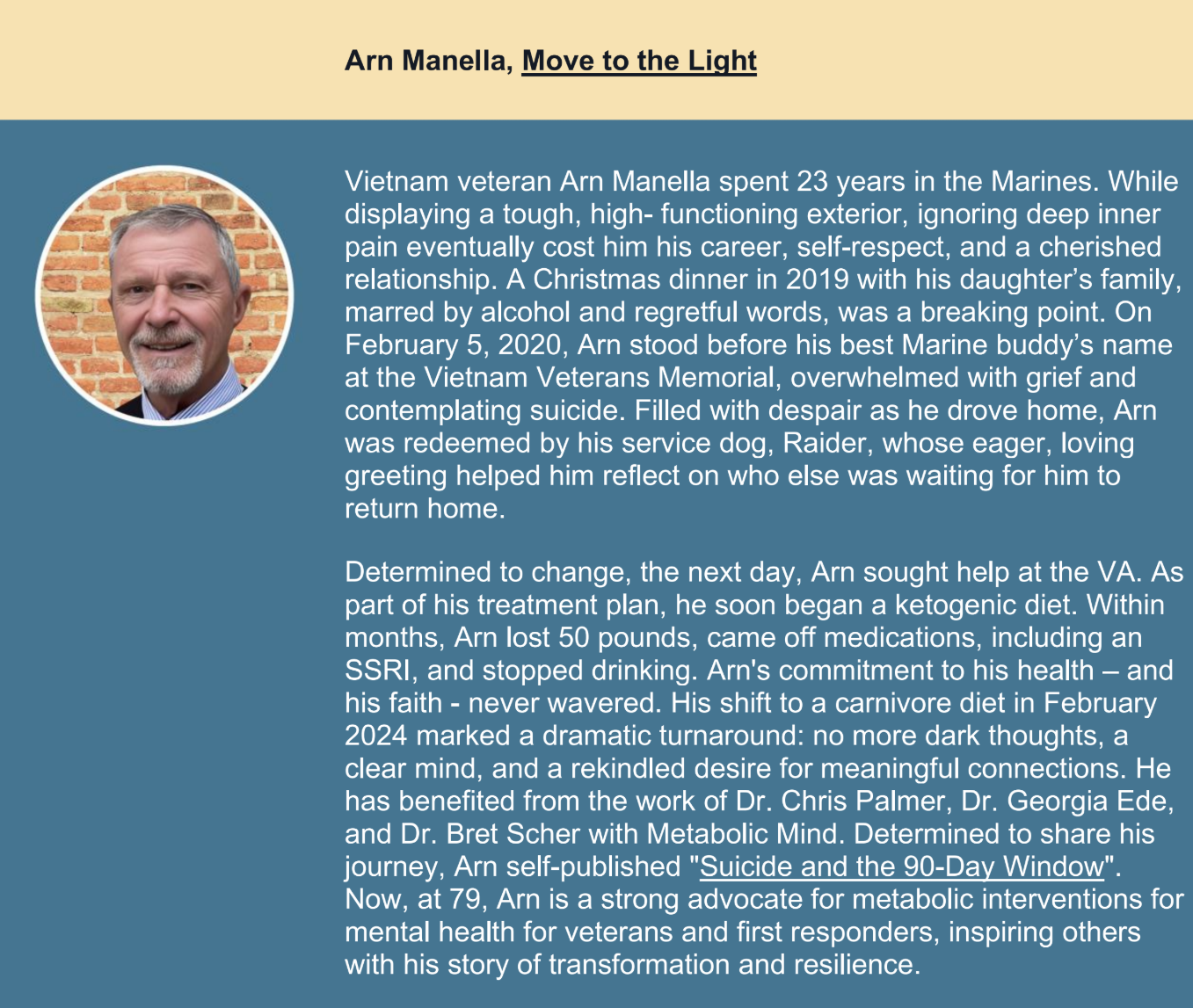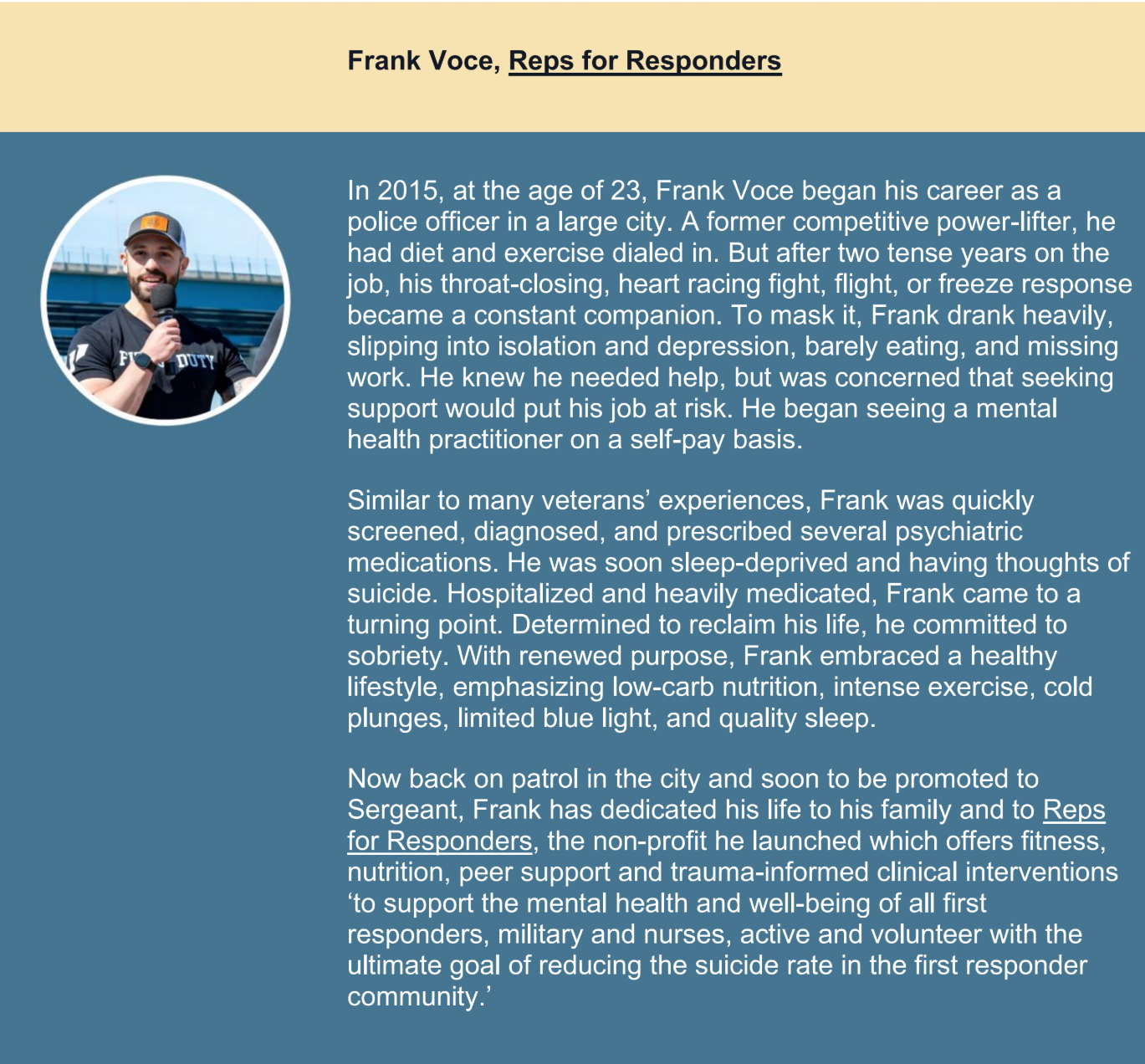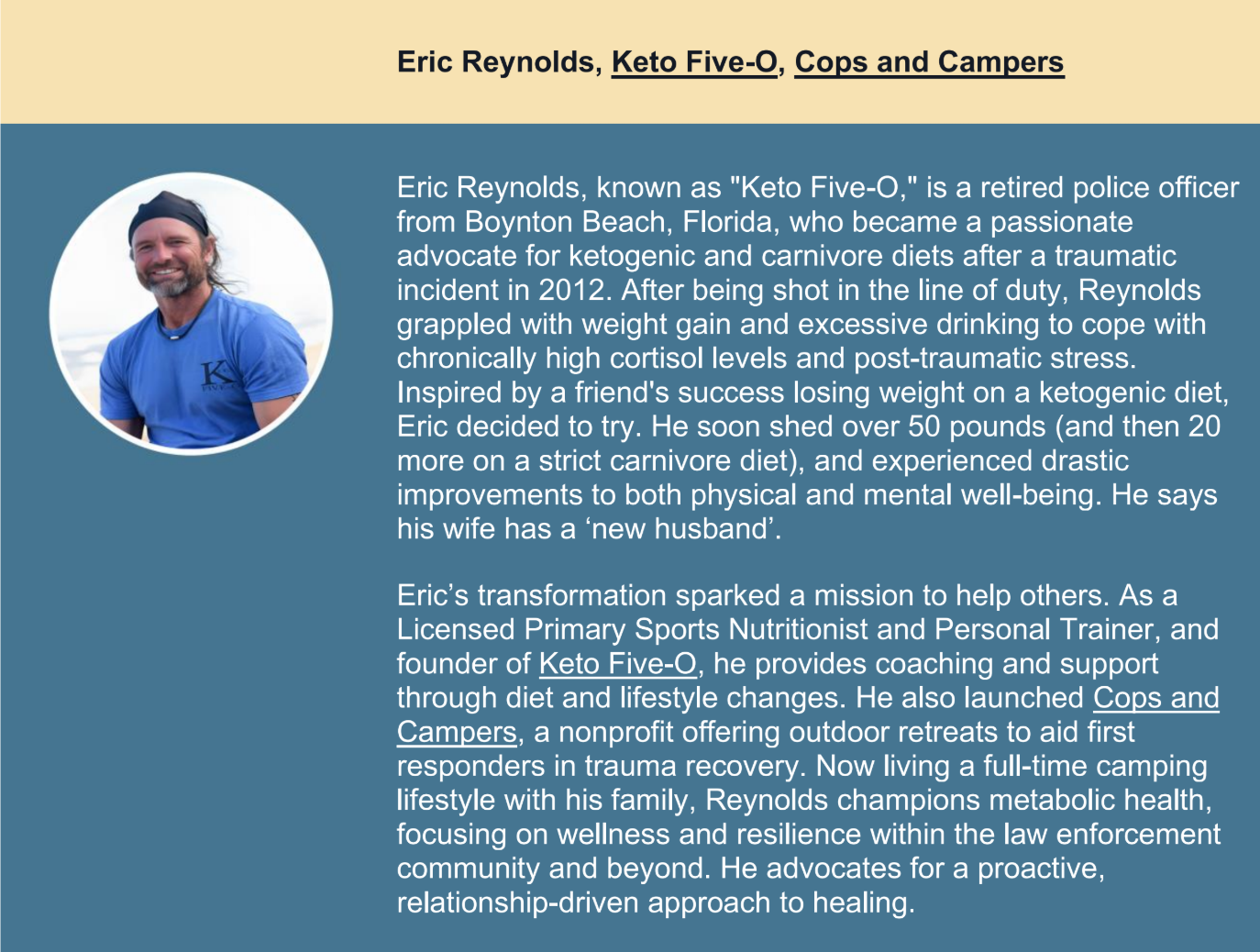The Evolution of Mental Health Care: The Case for Metabolic Psychiatry
The Crisis in Conventional Psychiatric Care
Within two days of each other in January 2022, in rural California, veterans Julia Larsen and Andrew Iles experienced unthinkable tragedies as their escalating psychiatric symptoms led to devastating outcomes for them and their families.
Larsen, a former Navy firefighter, suffered from post traumatic stress and psychosis after seeing combat and enduring military sexual trauma. Despite multiple pleas for help, she was denied immediate care at her local Veterans Affairs (VA) clinic leading to a night of terror when she fatally shot her mother.
Iles, a former Air Force technician, had received fragmented care from the same clinic. Frequent changes in providers and reliance on telehealth proved insufficient. On January 5th, while experiencing a paranoid delusion that his mother was poisoning him, he shot and killed her.
These incidents represent extreme failures in the current system. Larsen’s and Iles’ VA clinic had gone five years without a full-time psychiatrist and lacked same-day crisis appointments.
Grunt Style Foundation Veteran Impact Fellow Derek Blumke’s and Mad in America’s founder, Robert Whitaker’s data-packed article, “Screening + Drug Treatment = Increase in Veteran Suicides” looks beyond access to care, examining its safety as well. The 2019 article revealed a devastating reality: suicide rates among all veterans increased by 40% from 2005 to 2015, with a 74% rise among those aged 18 to 34.
These trends coincide with the VA’s expanded suicide prevention efforts, which amount to screening, diagnosing, and prescribing psychiatric medications, including antidepressants, which have been associated with both suicide and acts of violence. This data raises critical questions about prevention approaches and conventional treatments for veterans and for the general population.
Blumke and Whitaker reported that since 2000, the age-adjusted suicide rate for all Americans has increased steadily from 10.4 per 100,000 to 14.0 per 100,000 in 2017, despite greater access to psychiatric medications and mental health services. This crisis demands drastic change.
A Revolutionary Paradigm Shift: Brain Energy and Metabolic Psychiatry
Metabolic psychiatry holds that promise. Pioneered by Dr. Chris Palmer, Dr. Georgia Ede, Dr. Shebani Sethi, and others, metabolic psychiatry offers a revolutionary paradigm shift from on-going symptom management to total healing. It does not preclude the use of medication, but can drastically reduce or eliminate the need for it.
In his groundbreaking book Brain Energy, Dr. Palmer argues that mental disorders are metabolic disorders of the brain. Metabolism is the process that all living organisms use to convert food and light into energy to maintain or grow cells. It is fundamental to life.
Dr. Palmer explains that metabolic abnormalities in the brain result from mitochondrial dysfunction. Mitochondria—often referred to as the powerhouses of cells—are central not only to energy production but also to cell signaling, gene expression, and regulating cell death. Amazingly, mitochondrial dysfunction can be corrected.
As Dr. Georgia Ede, author of Change your Diet, Change Your Mind has said, ‘when our cells don’t get what they need, anything and everything can go wrong’. Fortunately, the science of healing is simple.
Healing Strategies: Metabolic Interventions
Metabolic interventions are strategies which restore insulin sensitivity, help to correct lipid levels, minimize inflammation and reduce oxidative stress - and in the process, alleviate psychiatric symptoms.
These strategies support proper mitochondrial function, which facilitates healing. They include:
Viewing sunrise and sunset directly, not through glass
Getting plenty of full spectrum sunlight directly on eyes and skin
Grounding: being in contact with the earth or trees
Eating and digesting outside, when possible
Journaling, meditating, talk therapy, somatic work, EMDR, acupuncture, etc
Doing heavy physical work
Doing satisfying mental work
Getting heat or cold exposure
Managing blue light exposure – excessive blue light can wreck the cortisol cycle, and
therefore the sleep cycle – causing trouble no matter what else you’re doing
Eliminating toxic food, substances, medications
Maintaining a sense of community and purpose
For many people, the most powerful metabolic intervention is a ketogenic diet.
A ketogenic diet shifts the body into ketosis—the metabolic state in which we burn fat for fuel rather than glucose. In ketosis, the liver converts fat into ketones which provide a stable energy source for the brain.
Dr. Ede describes the ketogenic diet as ‘the most powerful mental health treatment’ she has seen in her 25 years as a psychiatrist. She notes that patients’ sense of well-being, emotions, clarity of thinking, and memory improve quickly after starting it. Shifting into ketosis is appropriate for most adults and most psychiatric diagnoses, but it is important to involve healthcare providers if taking medication.
Stories of Transformational Healing
Link:
Links:
Lies My Doctor Told Me by Dr. Ken Berry
Toxic Superfoods by Sally K Norton
Brain Energy by Dr. Chris Palmer
Historical Context of the Ketogenic Diet as a Metabolic Treatment
Epilepsy: The ketogenic diet has been a proven treatment for epilepsy since 1920. Despite 100+ years of evidence and over 25 years of robust support, including 12 randomized controlled trials (RCTs), and 2 Cochrane reviews, many neurologists and top hospitals still do not recommend it as a first-line treatment. Denise Potter RDN, with 33 years of experience (17 with ketogenic therapy), calls this malpractice. Denise Potter - Is KD being underutilized?
Diabetes: In 1969, Dr. Richard K. Bernstein, frustrated with the American Diabetes Association’s ineffective guidelines, was the first to use a blood glucose monitor to track his blood glucose levels and to advocate for a low carbohydrate diet. His groundbreaking method, detailed in Diabetes Solution, is often dismissed by medical practitioners. However as those who follow his low carb method (TypeOneGrit) have proven, Dr. Bernstein revolutionized diabetes management.
Psychiatric Disorders: In 2009, Dr. Eric Westman’s weight loss patient, Doris, who had lived with treatment-resistant schizophrenia for 53 years, achieved remission after starting a ketogenic diet. In 2019, the Baszucki Group began funding research, leading to new insights into the diet's potential for treating schizophrenia.
Multiple Sclerosis (MS): Dr. Terry Wahls developed the Wahls Protocol, which includes ketosis and fasting, to put her MS into remission in 2007. She shared her story in a TEDx Talk 12 years ago.
Alzheimer’s: Dr. Dale Bredesen's ReCODE program has been helping patients reverse or improve cognitive decline since 2014, using a KetoFLEX approach. His work, along with that of Dr. Mary Newport (published in 2011), laid the foundation for use of a ketogenic diet in treating Alzheimer’s.
Other Neurodegenerative Disorders: Dr. Matthew Phillips, a metabolic neurologist, conducted the world’s first RCT of ketogenic therapy in Parkinson’s disease (2018) and Alzheimer’s (2021). His pioneering work includes the only case studies of time-restricted ketogenic therapy for ALS and Huntington’s disease.
Metabolic Interventions: Where Have You Been All My Life?
The Bayh-Dole Act
Seeking to spur innovation, Senators Birch Bayh (D) and Bob Dole (R) introduced legislation to promote the use of federally funded research, which tended to languish in government archives. Passed in 1980, the Bayh-Dole Act allows universities and nonprofits to patent and license inventions, sharing revenue with individual researchers.
Bayh-Dole led to massive financial gains for pharmaceutical companies. Blockbuster drugs like Humira, Prozac, and Seroquel, which generate over $1 billion annually, exemplify the revenue potential that now drives pharmaceutical research.
The profit motive favors investment in patentable products over natural, root cause solutions. To gain support from the NIH or philanthropists for research into non-patentable, natural interventions, scientists must make a strong case for their potential public health impact.
Metabolic interventions are in this category. Despite growing evidence that the ketogenic diet safely and effectively alleviates psychiatric symptoms, research— critical for widespread adoption —would scarcely exist if not for the Baszucki Group.
Industry Influence
The profit motive and conflicts of interest flow from academia through legacy organizations. As Neil Barsky wrote in his article for The Guardian, “Low-carb diets work. Why does the American Diabetes Association push insulin instead?”:
‘The big winners of the ADA’s cozy arrangements with industry, of course, are the pharmaceutical companies that enjoyed an estimated $58bn in annual sales in 2017, and the medical device and food companies who donate to the ADA in exchange for recipe endorsements.’
Pharmaceutical companies also influence the American Psychiatric Association (APA) by funding research and providing financial support to leaders who develop its diagnostic criteria and clinical guidelines. This relationship biases the APA toward medication-based treatment, robbing patients of the opportunity to benefit from non-pharmaceutical approaches.
Where Do We Go From Here?
We must prioritize the human experience over pharmaceutical companies’ profit motives.
Keeping in mind the devastating losses suffered by far too many and the remarkable transformations of others, like Frank, Eric, Andrew, and Arn, this is a rallying cry for the military, veterans, law enforcement, first responders, and the metabolic health community. We must unite to demand for non-pharmaceutical, metabolic interventions—metabolic psychiatry—to be offered as first-line treatments for anxiety, mood, and psychotic disorders.
Hannah Warren, Mental Health Communications and Advocacy Manager for Metabolic Mind*, who put Bipolar 1 into remission using metabolic interventions, said it best:
Battling the status quo is not going to be easy. Through positive community building, we can bring visibility to a broken system, but, even more importantly, we can also raise awareness of practical solutions that will create a ripple effect of healing, changing not just individual lives, but our collective future. In our corner, we now have a growing body of evidence demonstrating that healing is possible.
United, we will win!
*MetabolicMind a project of The Baszucki Group, is the most robust resource for Metabolic Psychiatry for clinicians and lay people. You can find Hannah’s article here: A Place for Anger in Healing: Positive, Purposeful, Pissed. Retrieved from https://www.metabolicmind.org/blog/a-place-for-anger-in-healing-positive-purposeful-pissed
Explore the Grunt Style Foundation’s Upcoming Events and Support their Work:
Reference List
ProPublica. (2024). Veterans Affairs Mental Health in Chico, Tester, McDonough. Retrieved from https://www.propublica.org/article/veterans-affairs-mental-health-chico-tester-mcdonough
Mad in America. (2019). Screening and Drug Treatment Increase Veteran Suicides. Retrieved from https://www.madinamerica.com/2019/11/screening-drug-treatment-increase-veteran-suicides/
Reps for Responders. (2024). Mission and Purpose. Retrieved from https://www.repsforresponders.org/
Cops and Campers. (2024). About Cops and Campers. Retrieved from https://copsandcampers.com/#about
One of One Billion. (2024). How Did We Get Here?. Retrieved from https://oneofonebillion.org/blog/howdidwegethere
The Guardian. (2024). Death by Diabetes - America’s Preventable Epidemic. Retrieved from https://www.theguardian.com/commentisfree/series/death-by-diabetes--america-s-preventable-epidemic
National Center for Biotechnology Information (NCBI). (2022). Fasting and Carbohydrate-Restricted Diets as Strategies for Restoring Mitochondrial Function. Retrieved from https://www.ncbi.nlm.nih.gov/pmc/articles/PMC9116908/
National Center for Biotechnology Information (NCBI). (2023). Study on the Impacts of Ketogenic Diets on Mental Health. Retrieved from https://pubmed.ncbi.nlm.nih.gov/30962118/
Bolton, D., & Krimsky, S. (2023). Industry Influence on the American Psychiatric Association: A Critical Analysis. In Ethics in Psychiatric Practice (pp. 65-90). Oxford University Press. https://www.ncbi.nlm.nih.gov/pmc/articles/PMC5688880/
Metabolic Mind. (2024). A Place for Anger in Healing: Positive, Purposeful, Pissed. Retrieved from https://www.metabolicmind.org/blog/a-place-for-anger-in-healing-positive-purposeful-pissed




